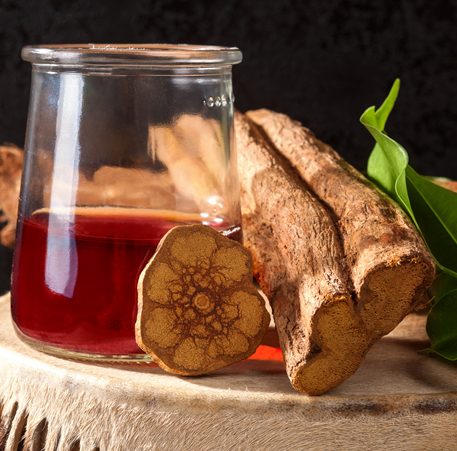Monographs licensed from Therapeutic Research Center, LLC
Alternative names: Appane, Ayahoasca, Caapi, Chacrona, Chacruna, Chaliponga, Daime, Dapa, Hoasca, Jagube, Jurema, Kawa, Mariri, Mihi, Natem, Ooasca, Orhoasca, Queen, Rainha, Soulvine, Yagé, Yajé
Actions: Anticancer, Neurologic/CNS, Substance abuse
Alternative names: Appane, Ayahoasca, Caapi, Chacrona, Chacruna, Chaliponga, Daime, Dapa, Hoasca, Jagube, Jurema, Kawa, Mariri, Mihi, Natem, Ooasca, Orhoasca, Queen, Rainha, Soulvine, Yagé, Yajé
Actions: Anticancer, Neurologic/CNS, Substance abuse
Ayahuasca is an herbal drink used during certain rituals in countries in the Amazon. It contains chemicals that affect the brain and might be unsafe.
The word "ayahuasca" comes from the words, aya, meaning spirit or soul, and huasca, meaning rope or vine, in the Quechua language. Ayahuasca is often made from the plants Banisteriopsis caapi and Psychotria viridis. The chemicals in ayahuasca are of interest for reducing symptoms of depression and improving mood.
Ayahuasca is used for suicide prevention, depression, grief, and many other conditions, but there is no good scientific evidence to support these uses.
When taken by mouth: Ayahuasca is possibly unsafe. Ayahuasca contains chemicals that can cause hallucinations, tremors, dilated pupils, increased blood pressure, nausea, and vomiting. Life-threatening side effects and death have also been linked with ayahuasca use.
Special Precautions & Warnings:
Pregnancy and breast-feeding: Ayahuasca is likely unsafe when taken while pregnant and breast-feeding. Along with causing hallucinations and other serious side effects, ayahuasca might be toxic to the fetus if used during pregnancy. Avoid using.
Anxiety: Ayahuasca might increase the risk of various mental health effects in people with anxiety. Don't use ayahuasca if you have anxiety.
Bipolar disorder: Ayahuasca might increase the risk of having a manic episode in people with bipolar disorder. Don't use ayahuasca if you have bipolar disorder.
Hallucinations and delusions (psychosis): Ayahuasca might increase the severity of hallucinations in people with psychosis. Don't use ayahuasca if you have psychosis.
There is interest in using ayahuasca for a number of purposes, but there isn't enough reliable information to say whether it might be helpful.
Ayahuasca is an herbal drink. The contents of the drink vary depending on the plants used and how they are prepared. Ayahuasca contains the chemical dimethyltryptamine (DMT) which might be unsafe. There isn't enough reliable information to know what an appropriate dose of ayahuasca might be.
Interactions with pharmaceuticals
Medications changed by the liver (Cytochrome P450 2D6 (CYP2D6) substrates)
Interaction Rating=Moderate Be cautious with this combination.
Some medications are changed and broken down by the liver. Ayahuasca might change how quickly the liver breaks down these medications. This could change the effects and side effects of these medications.
Medications changed by the liver (Cytochrome P450 3A4 (CYP3A4) substrates)
Interaction Rating=Moderate Be cautious with this combination.
Some medications are changed and broken down by the liver. Ayahuasca might change how quickly the liver breaks down these medications. This could change the effects and side effects of these medications.
Medications used for Parkinson disease (Dopamine agonists)
Interaction Rating=Moderate Be cautious with this combination.
Ayahuasca contains chemicals that can affect the brain. Taking ayahuasca with medications used for Parkinson disease might increase the effects and side effects of these medications
Serotonergic Drugs
Interaction Rating=Moderate Be cautious with this combination.
Ayahuasca might increase a brain chemical called serotonin. Some medications also have this effect. Taking ayahuasca along with these medications might increase serotonin too much. This might cause serious side effects including heart problems, seizures, and vomiting.
Interactions with herbs & supplements
Herbs and supplements with serotonergic properties: Ayahuasca increases a brain chemical called serotonin. Taking it along with other supplements that have this effect might cause serious side effects, including heart problems, seizures, and vomiting. Examples of supplements with this effect include 5-HTP, black seed, L-tryptophan, SAMe, and St. John's wort.
There are no known interactions with foods.
vital.ly has licensed monographs from TRC Healthcare.
This monograph was last reviewed on 24/03/2025 11:00:00 and last updated on 13/08/2022 08:07:39. Monographs are reviewed and/or updated multiple times per month and at least once per year.
Natural Medicines disclaims any responsibility related to medical consequences of using any medical product. Effort is made to ensure that the information contained in this monograph is accurate at the time it was published. Consumers and medical professionals who consult this monograph are cautioned that any medical or product related decision is the sole responsibility of the consumer and/or the health care professional. A legal License Agreement sets limitations on downloading, storing, or printing content from this Database. No reproduction of this monograph or any content from this Database is permitted without written permission from the publisher. It is unlawful to download, store, or distribute content from this site.
Natural Medicines rates safety based on scientific evidence according to the following scale: Likely Safe, Possibly Safe, Possibly Unsafe, Likely Unsafe, Unsafe, and Insufficient Evidence to Rate. For more information about Natural Medicines’ Safety Rating System,
click here.
The Natural Medicines Effectiveness Ratings are assigned for specific indications. A product might be rated "Possibly Effective" for one condition, but be rated "Likely Ineffective" for another condition, depending on the evidence. For more info
click here.



